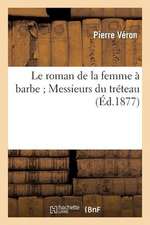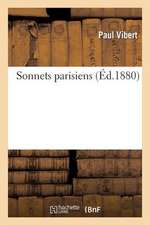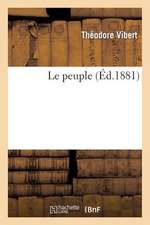The Brothers Ashkenazi
Autor I. J. Singer, Israel Joshua Singer Michael Greenbergen Limba Engleză Paperback – 30 sep 2010
First published in 1936, The Brothers Ashkenazi quickly became a best seller as a sprawling family saga. Breaking away from the introspective shtetl tales of classic nineteenth-century writers, I. J. Singer brought to Yiddish literature the multilayered plots, large casts of characters, and narrative sweep of the traditional European novel. Walking alongside such masters as Zola, Flaubert, and Tolstoy, I . J. Singer’s premodernist social novel stands as a masterpiece of storytelling.
Preț: 165.11 lei
Nou
Puncte Express: 248
Preț estimativ în valută:
31.60€ • 32.87$ • 26.09£
31.60€ • 32.87$ • 26.09£
Carte tipărită la comandă
Livrare economică 11-17 aprilie
Preluare comenzi: 021 569.72.76
Specificații
ISBN-13: 9781590512906
ISBN-10: 1590512901
Pagini: 460
Dimensiuni: 127 x 203 x 36 mm
Greutate: 0.45 kg
Ediția:Revised
Editura: Other Press (NY)
ISBN-10: 1590512901
Pagini: 460
Dimensiuni: 127 x 203 x 36 mm
Greutate: 0.45 kg
Ediția:Revised
Editura: Other Press (NY)
Notă biografică
Israel Joshua Singer, the older brother of Nobel Prize–winning Isaac Bashevis Singer, was born in 1893 in Bilgoraj, Poland, the second of four children of a rabbi. In 1916 he contributed to Yiddish newspapers in Warsaw and then in Kiev, and in the latter city his short story, “Pearls,” was published, which brought him immediate recognition. In 1921 I. J. Singer was hired as a correspondent for the Jewish Daily Forward. In 1927 he wrote his first novel, Steel and Iron, which was followed five years later by Yoshe Kalb. I. J. Singer came to the United States in 1934, and within two years The Brothers Ashkenazi was published, a work that was not only an instant success but was also destined to become a classic in its time. He died in New York on February 10, 1944.
Extras
The children loved the yard, no one more so than Jacob Bunem.
“Sima Meir,” he would cry in a loud voice that expressed his lust for life, “come play tag.”
“I don’t want to,” Simha Meir would say brusquely and turn away.
The twins didn’t get along.
Jacob Bunem would have preferred it otherwise. He was bigger, stronger, full of laughter.
“Jacob Bunem, why do you always laugh?” others asked.
“Cause I feel like it,” he would say, and laugh again so that the others felt compelled to join in.
He put his whole heart and soul into the childish games. No one could run faster, or find better hiding places in the foundation when they played hide and seek, or catch the ends of the cord the roper dragged through the courtyard. He could excavate the biggest rocks and raise them overhead. He never grew tired of the games. Not only did he enjoy playing, but he wanted everyone, especially his brother, to do the same. But Simha Meir would have none of it.
“Sima Meir,” he would cry in a loud voice that expressed his lust for life, “come play tag.”
“I don’t want to,” Simha Meir would say brusquely and turn away.
The twins didn’t get along.
Jacob Bunem would have preferred it otherwise. He was bigger, stronger, full of laughter.
“Jacob Bunem, why do you always laugh?” others asked.
“Cause I feel like it,” he would say, and laugh again so that the others felt compelled to join in.
He put his whole heart and soul into the childish games. No one could run faster, or find better hiding places in the foundation when they played hide and seek, or catch the ends of the cord the roper dragged through the courtyard. He could excavate the biggest rocks and raise them overhead. He never grew tired of the games. Not only did he enjoy playing, but he wanted everyone, especially his brother, to do the same. But Simha Meir would have none of it.
Recenzii
"A wonderful novel."
—Saul Bellow
“The book has the grand sweep of Tolstoy…pitch perfect artistry and pace.”
—The Wall Street Journal
“The Brothers Ashkenazi rates a place on any shelf devoted to modern works of art.”
—Newsweek
“A very powerful story has been seized upon by a very powerful story-teller…Singer has a stirring gift of narrative; he always writes with verve, sometimes with intensity; his book has magnitude and color and, as it were, a consciousness of its weighty theme.”
—The New York Times Book Review
—Saul Bellow
“The book has the grand sweep of Tolstoy…pitch perfect artistry and pace.”
—The Wall Street Journal
“The Brothers Ashkenazi rates a place on any shelf devoted to modern works of art.”
—Newsweek
“A very powerful story has been seized upon by a very powerful story-teller…Singer has a stirring gift of narrative; he always writes with verve, sometimes with intensity; his book has magnitude and color and, as it were, a consciousness of its weighty theme.”
—The New York Times Book Review





















